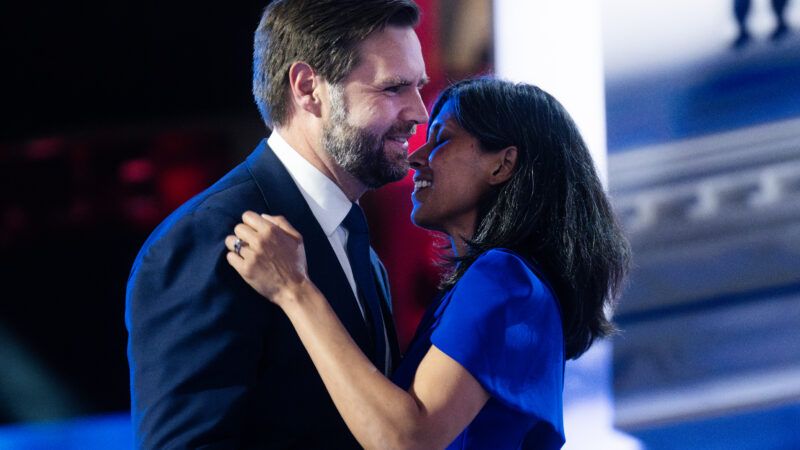From Usha Vance to Ballerina Farm: Denying Conservative Women's Individuality
Just because women are conservative doesn't mean they're oppressed.

Hannah Neeleman is a mother of eight, a beauty queen, a former Juilliard ballerina, and one of the most popular "momfluencers" on social media. She lives on a Utah ranch with her husband, JetBlue airlines heir Daniel Neeleman, and puts out both copious content and pasture-raised meat under the moniker Ballerina Farm. For years, their photogenic Mormon family has been amassing Instagram and TikTok followers—along with ample scrutiny and scorn from certain sorts of progressive-leaning, extremely online women. And these sorts were served a feast last month in the form of a London Times profile, which posited not-at-all-subtly that Hannah was being controlled and coerced by Daniel.
The profile was a little weird and the responses to it weirder. But they are also emblematic of something that goes way beyond Ballerina Farm: an inability to imagine women having different values, different politics, and different ambitions. And a refusal to accept that women may be happy leading all different sorts of lives.
Trad-Wife Tragedy
Times writer Megan Agnew clearly had an opinion about the Neeleman family's dynamics and framed her article to maximize the chances of readers coming away with the same opinion. That's not a journalistic crime by any means—the best profiles often inject some of the writer's own insight. But, to me, Agnew's insights felt shoehorned, and not entirely convincing. The quotes and anecdotes she wielded could betray a patriarchal arrangement in which Hannah is a not-so-enthusiastic participant. Yet there were lots of ways to read them that didn't support such a conclusion, and that's not to mention all the quotes and anecdotes that Agnew necessarily left out.
The internet, of course, ran with the tragic interpretation—Hannah as a put-upon waif of Dickensian (or at least Lifetime movie) proportions, all thwarted ambitions and rural isolation. A husband on a "sexist conquest" who stole her dreams, "trapped" her with eight kids, and now wouldn't even let her get a nanny or give her a trip to Greece for her birthday.
A consensus was emerging that Hannah needed to be freed.

But freed from what? Hannah has a life that many dream of, it seems. She may not be a professional ballerina, but she still has a highly successful career and a level of fame she likely never would have earned from ballet. She has a beautiful home, a wealthy husband, and eight healthy children whom she gets to raise in a spectacular setting an hour from where she grew up in a family that looks a lot like the one she has now (Hannah was one of nine children).
The interpretations of one journalist who spent a few hours with the family and a cornucopia of strangers' speculation aside, signs suggest Neeleman is happily living the life she wants to be living. It is highly weird to act like the fact that she once dreamed of being a pro ballerina means she's unhappy in any other lifestyle or that she didn't have other ambitions, too (especially since she has also talked about how she always wanted a big family).
Could Hannah be secretly miserable? Sure. But so could anyone.
Poor Little Political Wives
Reactions to Hannah Neeleman conjure that classic second-wave feminist trope: false consciousness. Sure, she says she is happy, fulfilled, and in control of her own destiny—but internet feminists know better. Clearly her claims are either an act (perhaps produced under the duress of a manipulative husband) or the result of being raised in a Mormon household. The poor dear can't even see how oppressed she is!
The Ballerina Farm discourse echoes recent reactions regarding Usha Vance, wife of Republican vice presidential candidate J.D. Vance.
Usha and J.D. met at Yale Law School. Usha also has an undergraduate degree from Yale and a master's degree from Cambridge. Until recently, she was a lawyer with one of the country's top law firms. At the Republican National Convention, she appeared confident and excited as she talked about her husband's candidacy and about their life together, which includes three children. Vance has, on numerous occasions, credited Usha for helping drive and shape him.
By all indications, Usha is an intelligent and accomplished woman who backs her husband's political career. Yet Vance, too, received the Hannah Neeleman treatment following her husband joining the Donald Trump ticket.
People began sharing images in which Usha was not smiling or looked sad as if this was proof that she disapproved of her husband's career, or worse.
Some surmised that J.D. must be an "abusive control-freak" whom Usha only stays with because this sort of thing was supposedly normalized by her Indian upbringing. Her "body language projects subservience." J.D. and/or the Trump campaign made her quit her job.
The comments about Usha Vance echoed a 2016 election-era refrain: "Free Melania." There were a lot of people then convinced, or at least opining, that Melania Trump wanted no part in her husband's political schemes and was a tragic figure trapped in a loveless and controlling marriage.
I won't pretend to know exactly what's going on between the former president and first lady. But the idea that Melania couldn't leave if she wanted to defies logic. The Melania who is literally trapped is a fiction, invented to further demonize Trump and/or deny that she is culpable in the creation of the life they both lead.

Voting for Harris Is 'in Everyone's Best Interest'
Shades of the same attitude driving this weird anti–fan fic about Usha Vance, Hannah Neeleman, and Melania Trump were detectable during a white women for Kamala Harris call last week.
During that call, author Glennon Doyle posited that the reason many white women are afraid to publicly support Harris and/or other Democratic candidates is fear of being disliked, chastised, or looked down upon. White women don't want to make neighbors "uncomfortable," and they "desperately need to be approved of and liked," Doyle said.
Meanwhile, Shannon Watts, who organized the call, suggested that the reason why many white women vote Republican is because they believe "that it is in our best interest to use our privilege and our support systems of white supremacy and the patriarchy to benefit us."
Voting for Harris is really what's "in everyone's best interest," said Watts.
This sort of rhetoric was common when Hillary Clinton was running for president and again after the election, when it came out that a majority of white women voters cast their ballots for Trump. Is there no room for imagining that some women might just be conservatives and/or dislike the Democratic candidate?
Can't Women Be Individuals?
In the construction of victimhood narratives around Hannah Neeleman, Usha Vance, and Melania Trump, there is an element of projection that is pre-political. Maybe it's rooted in jealousy, anxiety, revulsion, or anger. But for whatever reason, some people seemingly want to believe these women are unhappy. Perhaps it helps them get over their jealousy, or feel better about their own life choices, or feel there's still justice in the world—who knows? But it's clearly not based solely on the evidence laid before us.
The other thread underpinning some attitudes toward Melania Trump, Usha Vance, Hannah Neeleman, and any women who won't vote Democrat is a denial of conservative women's agency.
And while this thread has implications for politics, it also seems born of a realm outside of them. It's the inability—displayed here by the left, but also visible across the political spectrum—to imagine people genuinely believing in things different than what you believe.
In the political realm, this manifests as a conviction that support for different candidates and different policies doesn't come down to a million different factors and values and vibes but stupidity, brainwashing, coercion, and cowardice. Men get this treatment sometimes, too, but it's much more commonly aimed at women.
On the left, this manifests as utter disbelief that women like Hannah Neeleman and Usha Vance could be happy co-pilots in the lives they and their husbands are leading. Or as an insistence that the only reason women would oppose Harris is because they're trying to suck up to or benefit from white supremacy and patriarchy. On the right, we sometimes see it manifested as an assertion that female politicians, high-powered working women, feminist activists, etc., only speak out against conservative policies because they're bitter about their own lives.
Both sides do this at a peril to their own persuasive efforts. You won't win people over by telling them, "You may think you're happy, or expressing true convictions, but you're actually just a cog in cultural Marxism or white supremacist patriarchy."
What makes this especially weird coming from the left is that left-leaning women tend to do this under the mantle of feminism.
But it's not actually feminist to paint all women with one brushstroke. Women are not and will never be a monolith—not in their politics, their professional leanings, their preferred relationship styles, or anything else. Women are happy in as many different types of arrangements as men are, and as capable of choosing for themselves. Conversely, not every woman bristles at the kind of things that make some feminists bristle, including having a horde of children or moderating one's career plans to make this possible.
The sooner self-proclaimed feminists can see women as individuals—including sometimes very flawed individuals—the sooner we'll all be seeing women leading more free and full lives, in all their weird and messy and dazzling forms.


Show Comments (88)